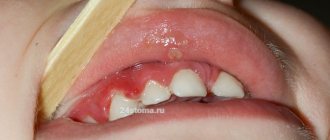Herpes on the lips (lat. Herpes labialis, in everyday life the names cold sores or fever on the lips are sometimes used) is a consequence of infection with a certain type of herpes virus. This disease is one of the common infectious diseases of the skin and mucous membranes, which is easily transmitted between people.
There are 8 known types of herpes simplex virus, and each type predominantly causes herpetic lesions of a certain type. Herpes on the lips is initiated by infection with the herpes simplex virus type 1, much less commonly with type 2. The type 1 virus can also cause other diseases, for example herpetic stomatitis, herpetic keratoconjunctivitis.
How does primary infection occur?
Often, the initial infection with a herpes infection has no symptoms and is not noticeable. But it happens that complications appear along with herpes:
- gingivostomatitis - inflammation of the oral mucosa and gums;
- an increase in temperature, accompanied by the appearance of blisters and ulcers in the mouth;
- herpetic panaritium (inflammation of the finger tissue) - the infection can spread to the fingers if they are pulled into the mouth;
- rashes can occur throughout the oral cavity, affecting the gums, which turn red and bleed. The child refuses to eat because the process becomes painful.
Treatment of herpes
If you have herpes, it is not necessary to immediately contact an immunologist, because the manifestation of this disease up to 4 times a year is considered normal. If the disease bothers you more often, then contacting a specialist is necessary.
To get rid of herpes, drug treatment is most often used. Antiviral ointments are used, which are sold at any pharmacy, and immunostimulating drugs can also be used.
If the necessary medications are not available when symptoms of herpes appear, then you can use folk remedies: garlic, toothpaste or fir oil. Use garlic internally, as it is considered a good antiviral agent, and smear the area of inflammation with either toothpaste or fir oil. Our patients note in their reviews that folk remedies sometimes help to cope with a sore faster than proven medications.
Remember the most important thing: if herpes begins to bother you more than 4 times during the year, contact a specialist.
How to fight a “cold”?
If herpes appears for the first time or in a baby under 6 months, and the disease is accompanied by fever and affects not only the lips, then you need to consult a pediatrician for antiviral therapy.
Often recurrent infections go away on their own. But you can shorten their duration by using local antiherpetic agents (active ingredient acyclovir).
Ways to reduce discomfort:
- apply a cold compress to the area of the rash;
- avoid sour and spicy foods;
- choose cool drinks;
- if there is severe pain, then use ibuprofen or paracetamol;
- Do not use products containing lidocaine due to possible side effects or overdose.
How to prevent the spread of the virus:
- it is important to ensure that the child does not scratch the rash and wash his hands;
- use individual dishes, towels, toothbrushes for a child with a herpes infection;
- during an exacerbation, you should not engage in contact sports;
- a child with a “cold” on his lips should not kiss other people.
Causes of herpes
The herpes virus is constantly in the body, but it is passive. Its appearance can be provoked by a decrease in immunity and, as a result, illness. Herpes can appear not only on the lips, but also on other mucous membranes - nose, eyes, genitals.
In addition to decreased immunity or a cold, the following factors can affect the appearance of herpes:
- severe hypothermia or overheating;
- stressful situation;
- mechanical injuries of the lip;
- severe intoxication of the body;
- excessive consumption of alcohol or tobacco;
- lack of vitamins in the body;
- pregnancy or hormonal imbalances;
- HIV;
- diabetes;
- contact with a sick person.
Symptoms and first signs
It is known that cancer begins to manifest itself at a time when it is too late to treat it. But if we are talking about lip cancer, then its first signs appear long before the formation of metastases.
Most often, patients complain:
- For the appearance of a lump in the area of the damaged part of the lip.
- The seal causes some discomfort as it increases in size.
- The top of the tumor is covered with a dense film, and when you try to remove it, severe pain occurs.
- Gradually, the compaction grows and increases in size, involving new tissues in the pathological process.
When the process of metastasis begins, a person exhibits other, specific signs:
- lymph nodes enlarge, they lose their mobility;
- their pain on palpation is noted.
The process of eating is gradually disrupted. A person cannot chew food and takes it in liquid form, resulting in exhaustion. The patient loses weight, his body cannot fully absorb nutrients and vitamins.
initial stage
At the first stage of disease development, scanty manifestations of cancer may be present. The person is not bothered by anything at all or the symptoms are mild.
It is worth paying attention:
- The appearance of a non-healing wound in the lip area. This could be a deep crack or ulcer that does not heal over a long period of time.
- The edges of the wound become thicker and painful. Gradually the size of the damage decreases.
- And the compaction grows, involving other tissues in the process.
Since tumor growth can be slow, it is recommended to pay attention to a wound that does not heal. It can bleed and secrete.
Traditional medicine for swollen lips
Swelling on the lips is rarely expected; rather, it takes you by surprise. It’s good if your home medicine cabinet contains pharmaceuticals suitable for each specific case. The victim probably has the opportunity to go to both a doctor and a pharmacy. But what to do when your lip is swollen at night? It is advisable to react to damage as quickly as possible; you have to use improvised, “folk remedies”.
Traditional medicine suggests solving the problem of swollen lips as follows:
- aloe juice - finely chop or crush a large leaf of an adult aloe (over 3 years old) and squeeze out the juice, soak a cotton pad in the juice (or you can wrap the aloe pulp in gauze) and apply to the swelling for 15-20 minutes;
- a mixture of turmeric, Fuller's earth and water - the powders must be taken in equal quantities and diluted with a small amount of water to a paste-like state; apply to the swelling for 15-20 minutes, then rinse with warm running water;
- baking soda - form a paste-like substance from baking soda and a small amount of water and apply it to the damaged area of the lips; after 10 minutes, rinse with cold water;
- honey - apply a thick layer of honey onto a cotton pad, apply to the swollen area for 20 minutes, rinse with cold water; repeat several times a day.
Types of drugs
The main group of tablets recommended for the effective treatment of herpes includes four nucleosides with similar effects - acyclovir, penciclovir, valacyclovir and famciclovir. An impressive part of the preparations use one of the above substances as the main component. It should be noted that components such as valacyclovir and famciclovir are not active.
Their activation begins only after they enter the digestive tract, where the transformation process occurs. Valaciclovir is converted to acyclovir, and famciclovir is converted to penciclovir. The substances affect the DNA synthesis of the replicating virus without affecting the pathogen that is in a latent state.
Based on their composition, herpes tablets can be divided not only according to the main components, but also according to their special properties.
For targeted treatment, doctors use:
- Medicines of a narrow specialization, so-called antiherpetic drugs (Acyclovir, Valtrex, Zovirax);
- Medicines related to immunomodulators (Anaferon, Galavit);
- It is possible to use interferon-containing agents, but some experts question the advisability of their use (Reaferon);
- Drugs that stimulate the body's production of its own interferon. This treatment regimen helps increase the intensity of the immune response to the virus (Arbidol, Lavomax, Cycloferon).
Antiviral
Antiviral immunostimulating agents come in a wide variety and are prescribed to support immunity. Such drugs are recommended not only for herpetic infections; there can be a great many indications for starting use.
Immunomodulators and antiviral drugs have general indications and their scope of application:
- Herpes of varying severity;
- Preventive measures and seasonal therapy of respiratory diseases;
- Fighting viral hepatitis;
- Treatment of cytomegalovirus;
- In joint therapy of multiple sclerosis, encephalitis, viral eye damage;
- Chlamydia;
- Tuberculosis.
Immunomodulators
Support of the immune system, in the case of herpetic disease, is prescribed for relapses, extensive lesions that abundantly cover the patient’s skin and mucous membrane. The most popular medication is Isoprinosine; herpes medications containing this substance are also prescribed.
Types and forms of lip cancer
Malignant formations of soft tissues are not uncommon; they are formed literally “out of nothing.” This is what is commonly believed, but in reality not everything is so simple.
The appearance of a tumor is associated with several factors. Previously, it was believed that smoking and addiction to alcohol were to blame. Now, the risks of cancer are increasing due to frequent infection with the human papillomavirus.
There are several types of malignant process; it is worth noting that oncological formations of the lip are rarely reactive in nature (that is, they develop rapidly).
What classification does the disease have?
- Squamous cell keratinizing cancer develops slowly, the disease involves new tissues in the process, but metastases rarely appear. Due to the long course of the pathological process.
- Squamous cell non-keratinizing cancer is characterized by rapid development, the process involves nearby tissues, and metastases affect the lymph nodes of the jaw and submandibular region.
It is worth noting that in comparison with other types of malignant process, cancerous tumors of the lips rarely metastasize, but it all depends on the stage of development of the disease:
| At the first stage: | As the disease progresses, the chances of metastases increase and are: | At stage 3: | If the pathological process reaches its final stage: |
| metastases appear only in 5-8% of cases. | no more than 20%. | metastases appear in 35% of patients. | then metastasis is observed in 70% of patients. |
If we talk about the forms of the disease, there are only 3 of them:
Treatment methods depending on the cause:
- If the formation occurs due to a viral infection, then treatment will be based on the use of antiviral drugs;
- If the cause is injury, then it is necessary to eliminate the consequences and rinse the mouth with antiseptics;
- If an allergic reaction provokes an illness, then you should find out what the irritant is and not use it anymore. The doctor will also prescribe antihistamines;
- If a large bloody bubble has formed, then surgery is performed. After this, the doctor prescribes medications for rapid tissue regeneration and restoration.
Complications of herpes on the lips
With mild or moderate inflammation, it disappears on its own. However, in infants and young children, for whom this is a primary infection, the symptoms of herpes on the lips and its consequences can become dangerous. But essentially this is due to the general primary infection of the child’s body with herpesvirus type 1.
Generalized infection. External symptoms are mild, but the general condition of a small child’s body resembles sepsis. Foci of infection are localized in the internal organs (lungs, liver, kidneys, spleen, brain), and can even lead to respiratory failure.
Transition to other organs and systems of the body. It is possible to transfer herpetic lesions to the skin, oral cavity, and eyes. In the visual system, inflammation of the cornea and conjunctiva (keratoconjunctivitis), as well as the retina and choroid (chorioretinitis) is possible.
Inflammation of the brain (encephalitis). The child has a high fever, severe lethargy, tense fontanel, convulsive seizures and coma are possible.
Reactivation of the virus (secondary infection) with symptoms of herpes on the lips can also lead to complications. Most often, the lesion spreads to the eyes - inflammation of the cornea (herpetic keratoconjunctivitis) with its clouding, scarring, visual impairment, even to the point of blindness.
An extremely dangerous complication is inflammation of the brain (encephalitis). In adults and older children, it can take an acute form, in which only three out of ten people survive without treatment.
Reasons for a swollen lip
Solving the problem of a swollen lip must begin with identifying the cause of the defect. This can best be done (from a professional point of view) by a doctor - dentist, dermatologist, surgeon, traumatologist, therapist. Any of them, based on an examination and anamnesis data, will make a conclusion about the origin of the swelling, but the list of reasons for both the doctor and the layman is approximately the same, the only difference is in the right choice, which is often not possible without specialized education.
So, what can cause a swollen lip? This:
- infectious diseases - both in the oral cavity and in the body as a whole;
- inflammatory processes - both in the oral cavity and in the body as a whole;
- traumatic damage to the mucous membrane, including piercing;
- injury;
- carelessly performed dental procedures;
- allergic reaction;
- herpes.
Correctly determining the reason why the lip is swollen is the basis for taking adequate measures to respond to the problem and solving it as quickly as possible.
Precancerous diseases of the lips
Precursors of oncology are pathological processes in tissues: inflammation, infection, bacterial damage. All this can provoke the development of oncology.
What diseases can lead to the development of lip cancer:
- Leukoplakia lips.
- Precancerous cheilitis.
- Hyperkeratosis of the red border.
Recently, there has been a tendency for papillomas to degenerate into malignant formations. If a wart appears on the surface of the lips, it should be removed. This will reduce the risk of developing cancer, but will not eliminate it completely. Since HPV is in the blood, which means it can recur when the activity of the immune system decreases.
Obligate precancer
Characterizes itself by the presence in a person of an innate predisposition to the development of malignant formation.
Such diseases include xeroderma pigmentosum, which manifests itself as increased sensitivity of the skin to ultraviolet radiation.
Recommended video:










